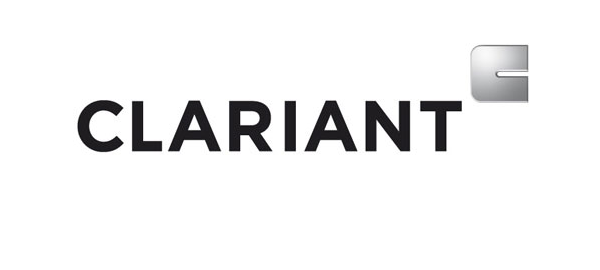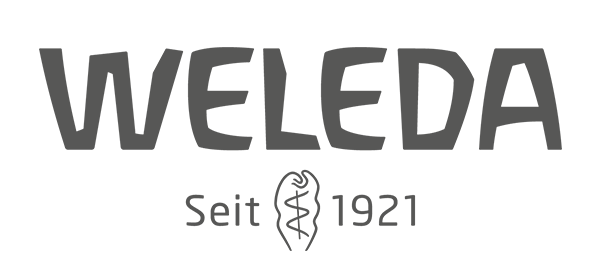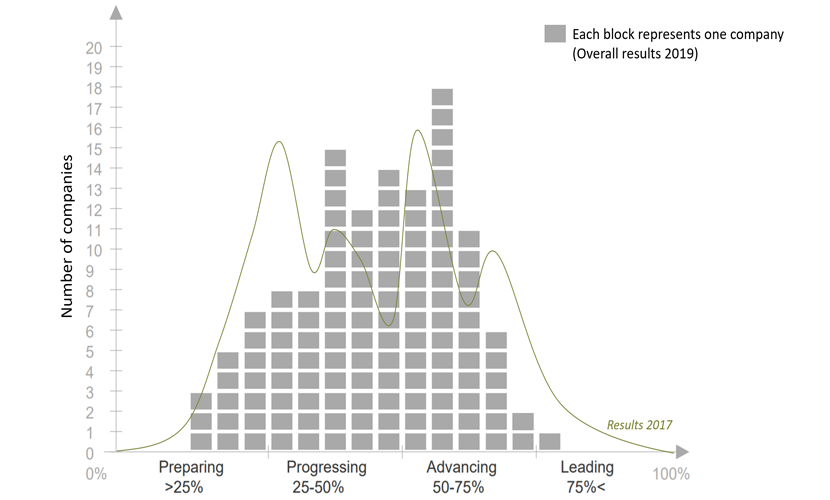Results in a snapshot
As in 2017, the majority of companies are in the mid-range, with 54 companies reaching between 25% and 50% of the achievable points (progressing) and 53 companies between 50% and 75% (advancing). 15 companies are in the “preparing” phase, by reaching less than 25% and 1 company is leading, by exceeding the threshold of 75%. Compared to 2017, the field moved closer together, with fewer companies in the “preparation” but also in the “leading” phase.
Biggest improvement potential:
- Conducting a materiality analysis and disclose process and results
- Setting SMART and impact-oriented targets up to 2030
- Engaging stakeholders and disclosing as well as integrating stakeholder feedback
- Focusing on hotspots along the value chain
- Reporting on critical cases/issues of the company and industry
TOP 3 companies in 2019

Clariant
Clariant is a Swiss speciality chemicals company, focusing on care chemicals (consumer and industrial), catalysis, natural resources (oil & mining, minerals), and plastics & coatings. The integrated report 2018 describes the materiality process and results in great detail and discloses stakeholder feedback on all material issues.

LafargeHolcim
LafargeHolcim Ltd is a Swiss multinational company that manufactures building materials. The company reports on material topics of the company, as well as many relevant issues for the industry and at global level (inside-out & outside-in perspective). Furthermore, it sets SMART and impact-driven goals.

Weleda
Weleda is a Swiss multinational company that produces both beauty products and naturopathic medicines, based on anthroposophic principles. Weleda’s 2018 Annual and Sustainability Report is distinguished by a clearly defined, integrated business and sustainability strategy that is reflected throughout the report.
Industry Ranking
On average, all sectors score around 45% (in 2017: 47%), with the food and beverage sector scoring highest with 58% and real estate scoring lowest with 33%. The sectors scoring above 50% – hence those classifying as ‘advancing’ sectors – are food & beverage, chemistry & pharmaceutical sector, retail & wholesale trade as well as construction builders & suppliers.
%
Average score
- Food & beverage sector (2017: 46%) 58%
- Chemistry & pharmaceuticals (2017: 51%) 57%
- Retail & wholesale trade (2017: 51%) 56%
- Construction builders & suppliers (2017: 57%) 51%
- Other service providers (2017: 59%) 48%
- Insurance services (2017: 42%) 46%
- Gastronomy & hotels (2017: 54%) 44%
- Mobility, transport & logistics (2017: 47%) 43%
- IT, Medical & electrical engineering (2017: 47%) 42%
- Machine industry (2017: 47%) 41%
- Energy supply & distribution (2017: 36%) 40%
- Financial services (2017: 42%) 40%
- Manufacturing industry (2017: 38%) 40%
- Real estate (2017: 35%) 32%
Average score per category
%
Comprehensive reports
(2017: 47%)
%
Credible priorities
(2017: 36%)
%
Relevant issues
(2017: 57%)

